The Childhood Struggles of INTJs
“I am just a child who has never grown up. I still keep asking these ‘how’ and ‘why’ questions. Occasionally, I find an answer.” – Stephen Hawking, an INTJ
INTJs are some of the most intellectual and intense children you’ll ever come across. They are analytical, watchful, and driven by a complex inner vision of how things will or could be. They are rare children, making up only 2.6% of the population, a fact which simultaneously pleases them yet can make them feel misunderstood and isolated. With an independent streak that can confound parents, they march to the beat of their own drum and question everything and it’s importance in the grand scheme of everything.
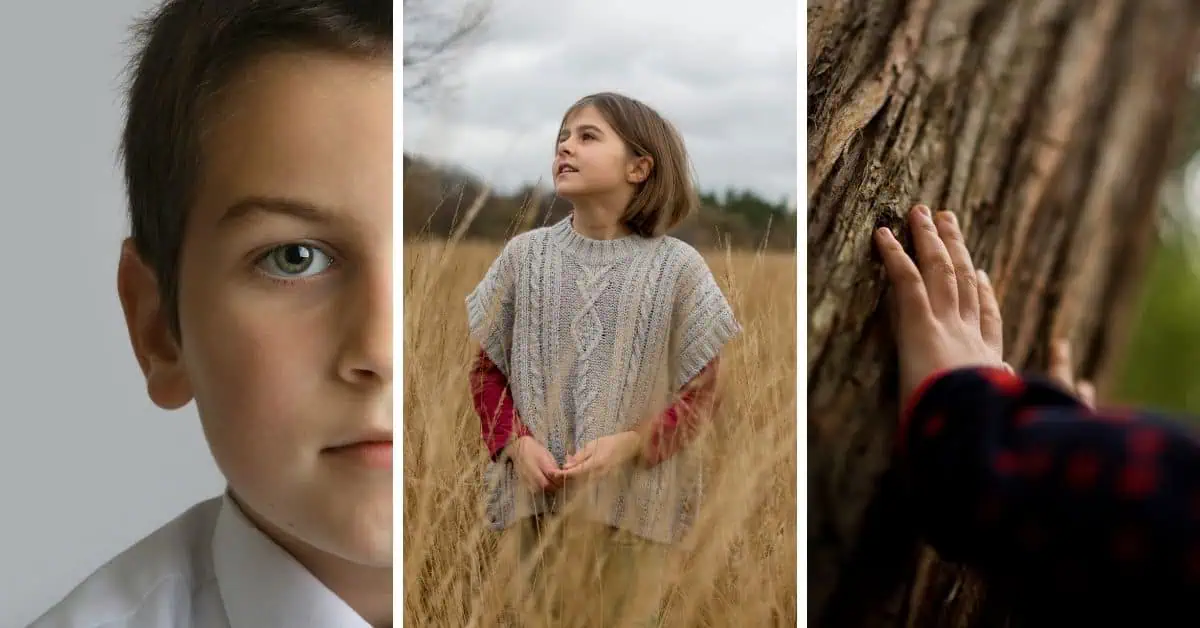
Parents are often intrigued yet concerned about their INTJ children. While these mini strategists are known for their high IQs, rich imaginations, and complex thoughts, they can also seem overly serious and hard to understand. This can leave parents wishing to know more, concerned that their child is unhappy or spends too much time in their own head. Young strategists have a plethora of gifts and talents, but they can often be misunderstood by their peers and by parents who aren’t used to such a rare personality. Young INTJs often have an advanced vocabulary, read earlier than their peers, and work fiercely to achieve their goals and understand new ideas. They are intensely curious, and will ask ‘why’ about anything that interests or confuses them. This leads us to one of the first childhood struggles INTJs are likely to face.
Table of contents
Estimated reading time: 14 minutes
Not sure what your personality type is? Take our questionnaire here. You can also take the official MBTI® here.
Not sure what your child’s personality type is? Take our new online questionnaire here.
Misunderstood Curiosity
INTJs are extremely independent and curious, even as children. They long to understand why things are the way they are, and to know the core truth behind every rule. They don’t have an innate sense of respect for authority, and they are unlikely to accept anything just because someone older than them “says so.” Instead, they want to know the logic and reasoning behind decisions, rules, and statements. This can be seen as argumentative or disrespectful, when in fact their questions and challenges are a natural part of the learning process for them. Unfortunately, this can cause them to be disciplined excessively by parents who want them to accept their leadership without question.
Anna Moss at Oddly Developed Types put it well when she said, “There is nothing more absurd and insulting to an INTJ than to be told, “Because I said so.” or “I gave birth to you, so do what I say.” Unreasoning obedience to illogical commands is not an INTJ’s strong suit. This will result in the INTJ losing respect for the authority figure in question. And Rationals are already skeptical of authorities and experts. Authority must prove its merit before it will be heeded, but if it fails once, the failure will never be forgotten.”
INTJs don’t always see arguing as a form of combat or as a sign of disrespect. For most NT types, arguing is another way of learning. They clear away all the social norms, the irrelevant details, and look for the core truth of any subject or rule. Stripping away anything that appears illogical or inconsistent helps them to have clarity, and so they naturally do this at every turn. They can often feel stifled as children by parents or teachers who are insulted by their questions and arguments and see them as a sign of dishonor or rudeness. The truth is that INTJs usually respect rules and will adhere to any rules they feel have a logical basis, but they need clear, rational reasons for obeying those rules before they will apply them to their lives.
“ As a child I knew that the adults in my life didn’t understand me. What was even more shocking was the fact that no-one ever seemed to try to understand. I was also picked on a lot by my teachers. It’s funny now that I think back, but I’m sure they didn’t appreciate a little kid making suggestions on how to do their job more
efficiently.”
– Sabrina, an INTJ
The Need for Alone Time
This isn’t to say that all INTJs want to be hermits and live in dark caves all alone. They enjoy engaging with other people and often have good social skills, but they are much more private than most and will need to be given plenty of time alone to access the introverted side of themselves. Many INTJs enjoy reading, writing, playing computer games, listening to music, or creating artwork. All these activities help them to harness their creative intuitive energy in solitude. Even at a very young age, many toddler INTJs like to find hiding places; cupboards, trees, quiet corners where they can get away and retreat into their minds.
Overstimulation
We’ve just talked about how INTJs need time alone. Another characteristic of types with dominant Introverted Intuition is that they are paired with inferior Extraverted Sensing (Se). Inferior Se means that INTJs are extremely sensitive to outside stimulation; noise, lights, interruptions. Paul D. Tieger and Barbara Barron-Tieger put it well in their book Nurture by Nature – Understand Your Child’s Personality Type and Become a Better Parent “Remember that the favorite place for INTJs is inside their own minds, and they often need to close the door on the outside world to center themselves and plug back into the source of their inspiration and energy.”
While extroverts and perceiving types have an easier time multi-tasking and dealing with background noise and interruptions, INTJs find sensory interruptions aggravating and intensely stressful. Whenever the inferior function is triggered too frequently, a person becomes highly stressed. For the INTJ, this means that sensory stimulation needs to be controlled and not invasive. You can find more out about this in my post Why INFJs and INTJs Get Overstimulated.
Misunderstood Perspectives
“The other source for feeling disconnected was that I often found myself confronted with what seemed to me to be a mass neglect for ambiguity. Often people would make statements that had multiple meanings but that for some reason were clear to everybody except me. There’s one example from first grade that I remember vividly. We had this test on left and right in which we had a paper with a bunch of people on them and we were supposed to draw a circle around either the left or the right hand of each person when the teacher said “left” or “right”. The instructions were alternately “draw a circle around the left/right hand” and “draw a circle around the hand you see as left/right”. I found that puzzling, because, if a person is face to face with me, I would see their left hand on the right side and vice versa, so I asked the teacher which of the two instructions I had to follow. To my great frustration, the teacher did not understand my question and repeated both instructions. More surprisingly, though, I seemed to be the only one who was puzzled by these instructions. Having been given no answer, I decided to encircle the person’s left/right hand (which I wasn’t supposed to do) and the school ended up thinking I could not tell left from right.”
– Samuel, an INTJ
Emotions and Tactfulness
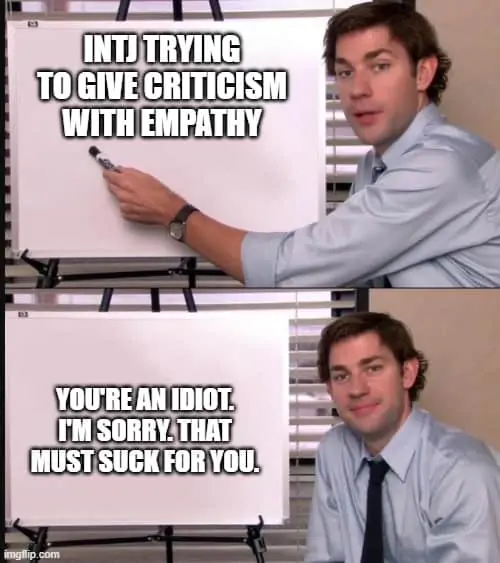
INTJs like to deal with the world of logic, facts, and theories. They keep their emotions internalized and are very private about their feelings. Parents or friends who try to push them to open up more may be met with disappointment as the INTJ, instead, becomes even more guarded and withdrawn. INTJs have tertiary Introverted Feeling (Fi) which means that they are unlikely to show their emotions outwardly and can be very difficult for other people to read. In fact, in the typology community many people talk about the “INTJ Death Glare.” This expression is not actually a glare, but the INTJs neutral expression. The “glare” is simply a combination of direct eye contact, prolonged silence, and an impassive expression. More emotive types may see this expression as a sign of dislike or rudeness, and concerned parents may worry that their young INTJ is depressed. INTJs may have to explain themselves more than they’d like when confused bystanders ask “what’s wrong with you?” “why are you mad?” or “why are you so serious?!” All of this can be very frustrating for the young INTJ, who may be simply considering the latest book they read or trying to decide what they want to eat!
This same outward stoicism can cause relationship struggles when it comes to decision-making and conversation. INTJs want to be as objective and impartial as possible, relying on facts and what can be determined as true or false. Young INTJs can say things that seem hurtful or tactless to other types, but were meant with no ill intent. For example, a friend might ask “Do these pants make me look fat?” and the ever-honest INTJ might answer “yes, they do.” The friend might be offended by the INTJs brutal honesty, and the INTJ may be left confused. After all, why ask the question if you don’t want an honest answer?!
For parents, it’s important to show young INTJs that you value their analytical thinking style and not take their criticism personally. Parents also shouldn’t coerce their young INTJs into having emotional conversations if they’re not ready. The INTJ can feel attacked or smothered if they are being forced to talk about feelings they’d rather keep private. If an INTJ does decide to open up to you about their feelings or emotions, it’s best to listen as quietly as possible without jumping in with thoughts or more questions. Being really listened to means a lot to an INTJ and is one of the most important characteristics they look for in relationships and friendships.
When it comes to tactfully conversing with others, parents do best by re-phrasing comments back to young INTJs in a more empathetic way. The INTJ is rarely intentionally mean or careless, but may have to learn to word things in a way that will not cause tension in their relationships or come across as harsh.
Bullying and Trouble Fitting In
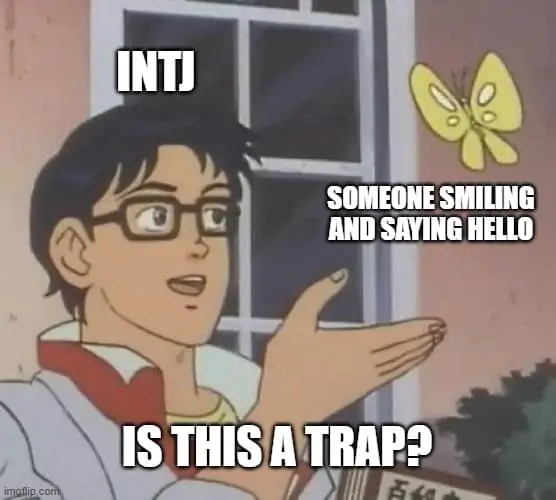
“I was bullied constantly in school, or else I would make friends and they’d eventually ditch me and make fun of me later. It’s caused me to have major trust issues into my adult life and I still have a hard time forming friendships that I feel I can truly count on.”
– Elena, an INTJ
INTJs and Perfectionism
NJ types are known for their intense perfectionism, and the INTJ is no exception. These independent personalities hold themselves to very high standards that can end up overwhelming them. They are extremely goal-oriented and can become obsessive about achieving their goals. Doing “good enough” isn’t appealing to them, unless they really don’t care about a subject. When it comes to subjects they care about, INTJs can be completely consumed in their effort to create the perfect project, essay, piece of artwork, etc,. This can lead them to becoming frustrated and angered if they are unable to meet their high expectations. At times, the young INTJ may feel overwhelmed and burdened by the massive pressures they place on themselves. They long to be exceptional in their fields of interest, and the idea of mediocrity is depressing to them.
Summing It Up…
While INTJs are often ahead of the pack when it comes to IQ scores, intelligence, and the ability to understand complex theories, they can also run into some struggles with being misunderstood and feeling isolated as children. It’s important for parents to nurture their unique abilities, their need for alone time, and their need to understand numerous “why’s” and “how’s.” Make sure to listen to your INTJ, give them plenty of creative opportunities, and engage in their sense of wonder about the world around them.
Find out more about your personality type in our eBooks, Discovering You: Unlocking the Power of Personality Type, The INFJ – Understanding the Mystic, The INTJ – Understanding the Strategist, and The INFP – Understanding the Dreamer. You can also connect with me via Facebook, Instagram, or Twitter!

Want a complete course on your personality type? Personality Hacker has training and courses for each personality type, complete with webinars, a 14-page course, audio advice sessions and more here.
Sources:
Nurture by Nature: Understand Your Child’s Personality Type – And Become a Better Parent
Gifts Differing: Understanding Personality Type
MBTI Manual: A Guide to the Development and Use of the Myers-Briggs Type Indicator, 3rd Edition
My True Type: Clarifying Your Personality Type, Preferences & Functions
Neuroscience of Personality: Brain Savvy Insights for All Types of People
Type Talk: The 16 Personality Types That Determine How We Live, Love, and Work
Article: The INTJ Mastermind
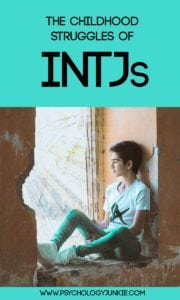
Get Your Free eBook!

Subscribe to our newsletter and get an eBook packed with powerful parenting tips for each personality type! Enjoy 28 beautifully illustrated pages exploring the needs and strengths of all 16 personality types in childhood.


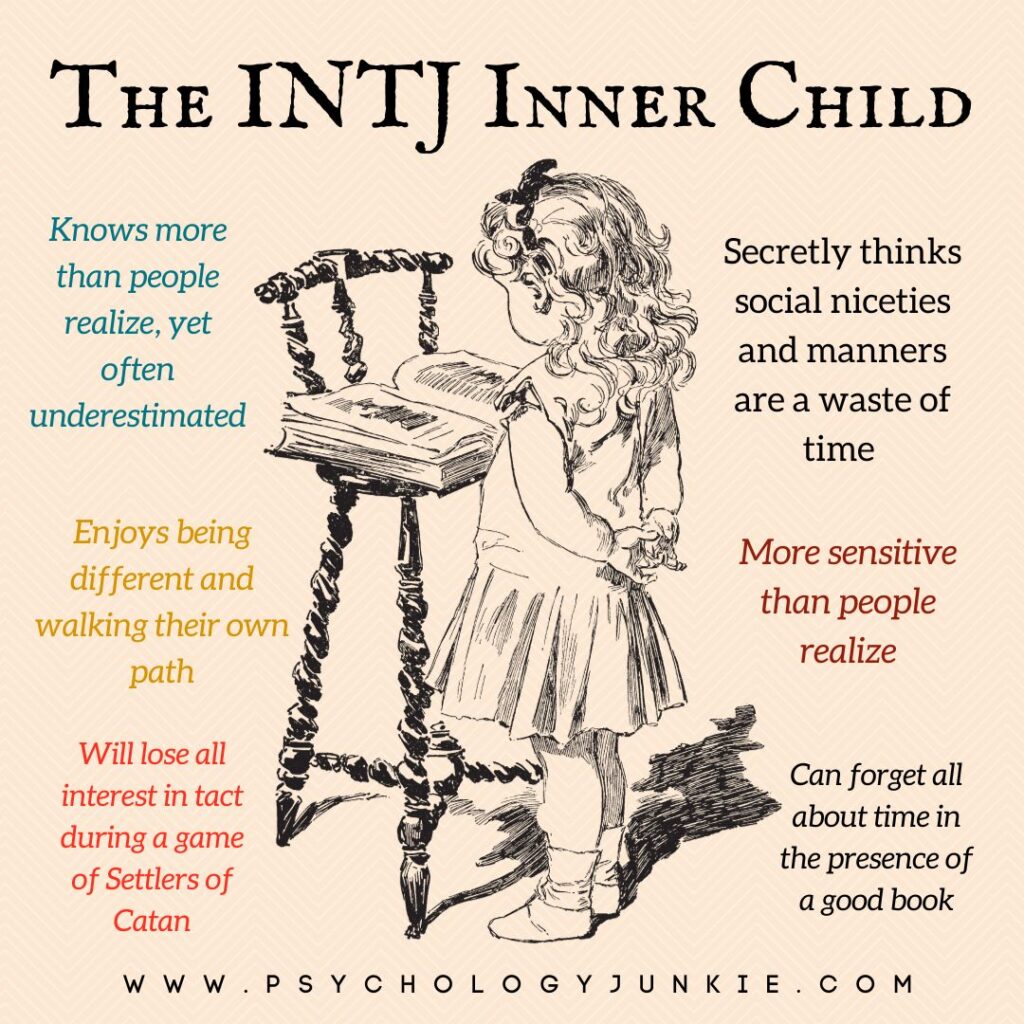
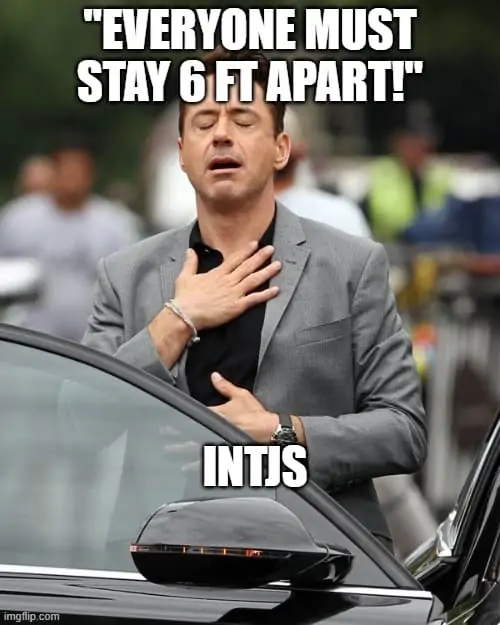
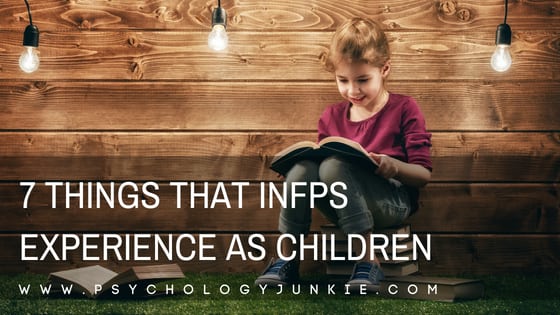









I feel so validated! I grew up thinking I was crazy for many of the traits you explained here. Thank you so much for your work here. I plan to pick up the parenting book you mentioned, and read more of your articles. You may have saved my life.
by Edgar Allan Poe
This is such wonderful and beautiful article. I really enjoyed reading it.
Oh my gosh. I thought something was wrong with me for so long. I’m an INTJ/ENTJ. Articles like this one really help me feel at peace with who I am.
Thank you for this wonderful article on the INTJ personality. I feel like I understand myself a little more now.
I was bullied until I decided to learn how to fight. The problem was then my justification of sometimes brutal conflict cessation to prevent future fights. My teachers did not agree with my tactic. (although few bullied me afterward)
When I was in grade school, I had a lot of trouble fitting in with the rest of the kids, so I set out to get friends will cost what it’s going to cost, that was a big mistake because I started lying and imitating other people’s attitudes just to fit in. At home my parents used to talk all the time about my older brother and I felt that no one respected me, I suffered a loop of Ni and Fi, they are years that I really want to forget, but my mind keeps repeating my mistakes
Many of the characteristics listed above correlate with my current personality. However, as a teen, I didn’t exhibit these INTJ qualities until middle school. Of course, even if you display common traits of an analyst as a child, it doesn’t mean you are going to be an INTJ as a fully-developed adult. Personalities can change and adapt.
When I was a kid, I think I acted like any other average five-year-old: Obnoxious, self-centered, and childish. I doubt I flaunted a cold, cutting intellectualism or the spirit of innovation. And if I did, by any chance, seem like a brilliant/socially-inept toddler, my parents failed to inform me.
As a current INTJ/INFJ kid, I can definitely confirm the majority of these points. The “INTJ Death Glare” is something that has actually happened to me a few times, too. Had a teacher ask if I was okay in the middle of class. I didn’t even realize she asked me and thought she asked someone behind me, but when I turned to see if she was, she was kinda like, “Well, I guess you’re okay.” and awkwardly continued with the lesson.
About the right/left hand where to write was very relatable since I’m an intj. That time when your teacher gives instructions about something and everyone understood except u..Well also the bullying, really I didn’t have any friends in elementary..One teacher also dislike me cause I’m so quiet..and in 7th grade one of my brother’s friend hated me because of my neutral face, like really..anyway this is pretty accurate 👍
Me too it was quite accurate when I was in grade 2
This is very accurate for me. All my life I’ve been called mean, weird, a hippy. I excelled at science, history, computers and design but I struggled with math because I couldn’t understand why it was so important to learn things I was never going to use like finding out the area of shapes.
I didn’t have dolls as a child because playing pretend was a waste of time but I did have many various science kits.
I detested family parties because everyone would talk down to me and then get annoyed when I told them to stop treating me like an idiot and go and sit outside on my own until I was ready to go back.
I am now 18 years old and in May 2023 I graduated from school. When I was young, I was teased a lot, and there were many embarrassing situations. I was a very shy, quiet child with no self-confidence. But in my own street I was the opposite, I led the children. I did not allow them to insult each other. This is probably because of my enneagram 8w7 function. But over time, as I began to understand myself, I reached the point where my self-confidence was unbreakable. Because of old memories, I became a very quiet, independent, withdrawn, isolating person.
8w9
This article was a nice read, also it gave me some explanation to why people view me the way i am. I think the INTJ personality answer a lot of my questions. Overall, well done.
“Emperor’s new clothes” wow, that is a great way to explain it.
As a kid I thought it was just odd. I used to pass it off as others just not being that good at explaining things. It was not until much later I realized that they just don’t get it as an INTJ does. People live happily oblivious of their strange, and faulty, assumptions on how the world is explained.
In the 90’s, as a teen, I watched The Matrix. I ended up totally identifying with Neo. Not the “savior” part, but that particular scene where he “sees” the Matrix. That is how it feels to be an INTJ in the educational system. Everything is trivial and transparent and nobody seems to understand that a person can just see the alpha and the omega of it at the same time.
Except of course the irrational obsession with social relations and status. Even as adult I struggle to understand that at times.
I got into arguments with my teachers, with my parents, and probably could not name half of my grade school classmates today (or high school or for that matter).
It lead to me unhealthily developing some pretty severe grandiosity issues. I spent 20 years as adult chasing and challenging, looking for a room where I was not the smartest. Being a showy a-hole. Misinterpreted for wanting to get spotlight and show off, when all I wanted deep down was to find peers.
After delwing into personality types inspired by an HR colleage some years back I have found answers. Both to why I felt so different, but also to why I was so childish in how I treated people in my pursuit of answers.
The world is not equipped to handle INTJ children. When 10year olds are smarter than their teachers. When they can logically deduce the curiculum in grade school mathematics. When the INTJs painfully know it, but the adults “teaching” them don’t.
The system fail to pivot and teach them to be humans. What comes naturally to most other types is an acquired skill for INTJs.
It makes no sense to teach personality types to most kids in grade school. However the rational logic brain of INTJs need it. They need to understand what makes them different so they can develop healthy coping mechanisms until they are out of the school system and can pick their own friends.
Se + isolation does bad things to children everyone thinks are just “quiet kids”.
We will not have innovators to solve the future’s problems if all the INTJ children succumb to addictions and destroy their own potential.
Thanks for your insights. I can clearly relate to (most of) the mentioned INTJ struggles while growing up. Is it correct to state that ENTJs are likely to struggle similarly to INTJs during childhood and young adulthood? Especially, since ENTJs are not necessarily people focused like some other extraverted personality types. Even more so, I have read in several typology related blogs that among ENTJs it is not uncommon to mistype as an introvert. I was one of them; going from INFJ to INTJ and from there to INTP, ENTP and finally finding my best-fit type: ENTJ. Best regards from an ENTJ, 7w8 (784 tritype), creative subtype ENTJ-C.